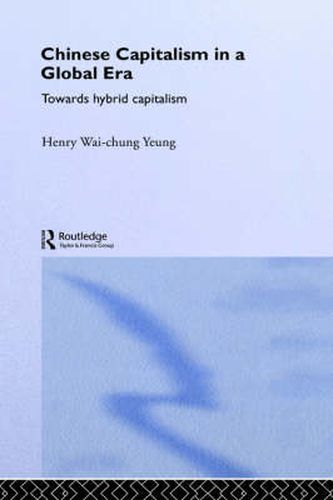Readings Newsletter
Become a Readings Member to make your shopping experience even easier.
Sign in or sign up for free!
You’re not far away from qualifying for FREE standard shipping within Australia
You’ve qualified for FREE standard shipping within Australia
The cart is loading…






Chinese Capitalism in a Global Era examines the dynamic ways in which millions of ethnic Chinese in East and Southeast Asian economies organize their economic activities. It analyses how Chinese capitalism has changed under conditions of contemporary globalization and anticipates what the future holds for it. The book challenges the conventional notion of Chinese cpitalism as ‘crony capitalism’, based around kinship networks and untouched by globalization. Yeung argues rather that key actors are capable of taking advantage of their participation in globalization processes to significantly transform the nature and organization of Chinese capitalism in East and Southeast Asia. He concludes that the system that is emerging is neither distinctively Chinese nor converging towards the Anglo-American form of capitalism, but a hybrid of both. The book is comprehensive in its scope of analysis, interdisciplinary in its coverage of literature, and well grounded in a wide variety of empirical evidence that addresses different sectors and economies in Asia. It will be of interest to students and researchers in the areas of international political economy, economics, Asian studies, development studies, organization and management studies, economic geography and urban studies.
$9.00 standard shipping within Australia
FREE standard shipping within Australia for orders over $100.00
Express & International shipping calculated at checkout
Chinese Capitalism in a Global Era examines the dynamic ways in which millions of ethnic Chinese in East and Southeast Asian economies organize their economic activities. It analyses how Chinese capitalism has changed under conditions of contemporary globalization and anticipates what the future holds for it. The book challenges the conventional notion of Chinese cpitalism as ‘crony capitalism’, based around kinship networks and untouched by globalization. Yeung argues rather that key actors are capable of taking advantage of their participation in globalization processes to significantly transform the nature and organization of Chinese capitalism in East and Southeast Asia. He concludes that the system that is emerging is neither distinctively Chinese nor converging towards the Anglo-American form of capitalism, but a hybrid of both. The book is comprehensive in its scope of analysis, interdisciplinary in its coverage of literature, and well grounded in a wide variety of empirical evidence that addresses different sectors and economies in Asia. It will be of interest to students and researchers in the areas of international political economy, economics, Asian studies, development studies, organization and management studies, economic geography and urban studies.